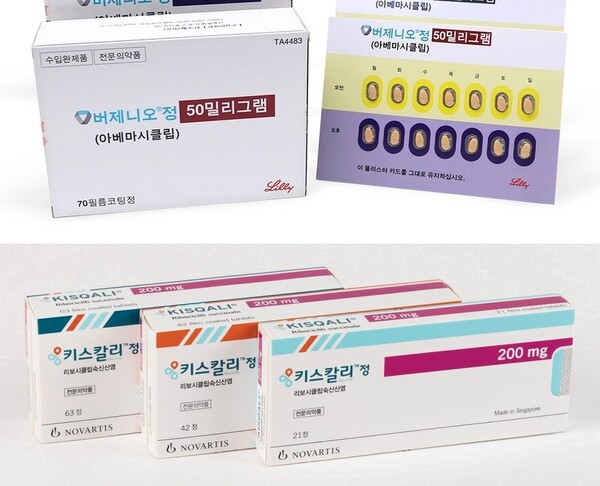Following Verzenio (abemaciclib), Kisqali (ribociclib) will likely become available in Korea as an endocrine and adjuvant therapy after early breast cancer surgery.
Health insurance coverage is key to increasing patient access, and if Kisqali is approved, the timing of coverage could change the prescribing landscape for both drugs.
Early-stage breast cancer is defined as a condition in which cancer cells have not spread beyond the axillary lymph nodes. It accounts for about 95 percent of all new cases of breast cancer diagnosed worldwide. Five-year survival rates are high: 98.3 percent for stage 0, 96.6 percent for stage 1, and 91.8 percent for stage 2.

However, recurrence rates are also high, ranging from 27-37 percent for stage 2 breast cancer patients and 46-57 percent for those with stage 3 disease, making it critical to develop treatment strategies that prevent recurrence.
Clinical practice suggests that CDK4/6 inhibitors should be prescribed in combination with postoperative endocrine therapy for patients with early-stage breast cancer. It is possible to prevent recurrence and even cure patients.
“Early breast cancer is known to have a high survival rate, but the prognosis for those at high risk of recurrence is different from those who are not at high risk,” said Professor Park Kyong-hwa of the Department of Medical Oncology at Korea University Anam Hospital, at a media session on Wednesday. “They often experience repeated recurrences, and the survival rate is relatively very low, so this is the last stage where active treatment can be given with the goal of cure.”
Currently, Verzenio is the only CDK4/6 inhibitor available in Korea that can be prescribed in combination with endocrine therapy in patients with early-stage breast cancer. In addition, Kisqali, a drug in the same class, is undergoing the approval process to expand its indication to early breast cancer in Korea, which will further increase treatment options.
Although they are in the same class, the two drugs have distinct clinical designs and are prescribed for different patient populations. Whereas Verzenio focused on patients at high risk of recurrence, Kisqali was studied in a broader population than Verzenio.
The monarchE phase 3 patient population that was the basis for the approval of Verzenio included: four or more lymph node metastases; one to three lymph node metastases and tumor size greater than 5 centimeters; one to three lymph node metastases and tumor grade 3; one to three lymph node metastases and Ki67 expression of 20 percent or more.
In contrast, Kisqali's phase 3 NATALEE study in metastatic breast cancer demonstrated clinical utility in a broader patient population than Verzenio, including HR+/HER2- breast cancer patients with stage 2 or higher, including those with no lymph node metastases (N0).
“Although Verzenio and Kisqali are in the same class of drugs, they have different patient populations,” Professor Park said. “Kisqali's NATALEE trial included both intermediate- and high-risk patients, while Verzenio's monarchE phase 3 trial included high-risk patients from the outset and has a long data follow-up (five years), which is highly credible.”
"If I were prescribing in clinical practice, I would probably use Kisqali for moderate-risk patients who are willing to be treated, but I would consider prescribing Verzenio for high-risk patients," she added.
Ultimately, the patient's stage and side effects are likely to influence the decision to prescribe either of these drugs.
"Kisqali has been shown to have rare hepatotoxicity and electrocardiogram effects, and Verzenio has side effects such as diarrhea," Park said. "In the end, prescribing will be based on the patient's comorbidities."
For both drugs to be widely prescribed in clinical practice, reimbursement is key. Lilly is in the process of gaining reimbursement for early breast cancer, but it is facing challenges. This year, the company is actively pursuing coverage expansion in early breast cancer based on appropriate pricing and long-term follow-up data.
Kisqali is also expected to compete directly with Verzenio in the treatment of metastatic breast cancer, depending on how quickly it can move through the approval and reimbursement process.
Related articles
- Eli Lilly calls out Korea as Verzenio’s $36K cost threatens cure window
- Two experts agree Verzenio increases chances of cure for women with high risk of early breast cancer
- Novartis' Kisqali cleared in Korea as adjuvant therapy for stage 2-3 early breast cancer
- After celebrity breast-cancer awareness gala, a stage-IV patient lays out Korea’s Ibrance gap
- [ESMO 2025] Kisqali adjuvant therapy maintains efficacy at 5th year

